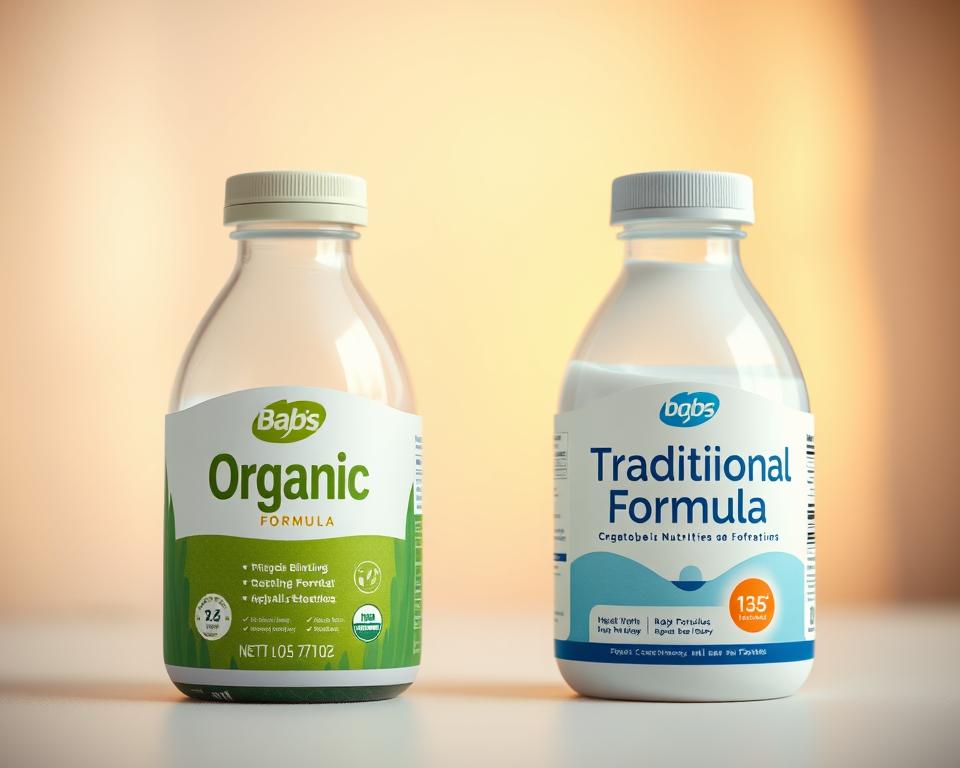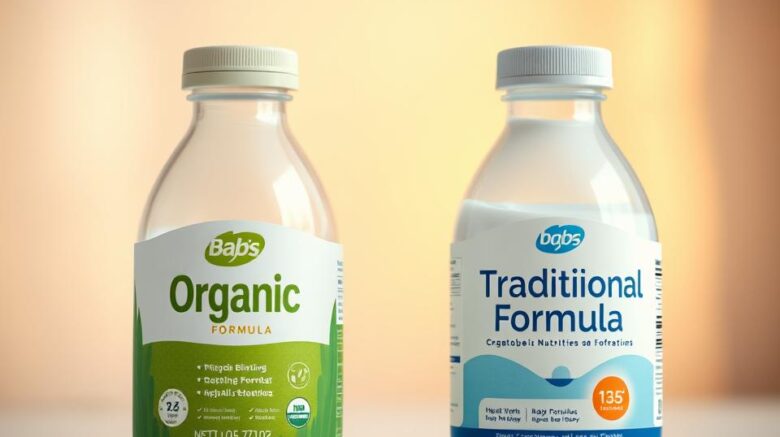Uncover the Best Organic Formula Options: Mom & Dad’s Manual
Nearly 80% of parents in the United States use baby formula at some point in their infant’s first year. This is often due to breastfeeding challenges. Selecting the proper organic formula shop proves crucial for such households. This resource supports parents in selecting top organic options for infant nutrition.
We’ll review key brands and blends with an eye on purity and nutrients. This information is vital for ensuring a healthy start for your child.
Every caregiver faces the weighty choice of baby’s first foods. Formulas made from certified organic ingredients have surged in demand. It delivers a purer nutrition source. By excluding chemical residues, they ensure a safer early diet.
Parents are increasingly mindful of the absence of harmful chemicals like GMOs and artificial additives. Such concerns drive the trend toward organic as a safer nutritional path.
Perks of Using Organic Elements
Certified organic components deliver notable advantages. These ingredients are rigorously tested, ensuring higher quality and safety. Picking organic varieties lets caregivers know their baby avoids toxic residues.
The cultivation processes involved in organic farming emphasize sustainability and environmental preservation. Hence, selecting organic amplifies wellness and ecological care.
Related Developmental Gains
These formulas may foster healthier developmental results. Many studies suggest that babies receiving organic nutrition may exhibit fewer gastrointestinal issues and a lower likelihood of allergies. Purity stems from their additive-free makeup.
Moms and dads value how organics deliver complete nourishment. They support both growth and overall wellness for their babies.

Essential Criteria for Choosing Organic Formula
Picking the top organic formula plays a huge role in infant health. It’s important to consider the protein sources and the essential nutrients. The type and ratio of proteins can affect how well a baby digests and uses nutrients. Understanding necessary additives guarantees your infant thrives.
Whey vs. Casein Balance
Most baby formulas use whey and casein as protein sources. Whey breaks down quickly and casein releases nutrients gradually. More whey generally equals gentler digestion for infants. Organic brands usually prioritize elevated whey levels for ease of digestion. Choose products that specify their protein blend and proper proportions.
Vital Additives and Health Boosters
It’s vital to consider the essential nutrients in infant formula for development. Docosahexaenoic acid and arachidonic acid support neural and visual development. Prebiotics also play a role in digestive health and immune system strength. Check for these additives in formulas to ensure your baby gets a full range of nutrients. Organic formulas that focus on these nutrients offer a rich source of nutrition.
| Protein Source | Benefits | Whey-to-Casein Ratio |
|---|---|---|
| Whey | Easier digestibility|Gentle on tummies|Quick absorption | Higher ratio is better|Lean whey blend preferred|Above 60% ideal |
| Casein | Slow release of nutrients|Sustained nourishment|Stomach-friendly over time | Lower ratio preferred in early months|Casein kept minimal|Around 40% or less |
Popular Organic Baby Formula Brands
Parents seeking the best organic baby formula often turn to trusted brands known for quality. Below are notable labels and what makes them special. They lead the organic formula market, serving diverse dietary demands.
Kendamil: The Whole Milk Option
Kendamil’s formula uses pure whole milk for distinct creaminess. It offers a smooth mouthfeel without synthetic extras. Caregivers favor it for its simple, clean ingredients. Ordering Kendamil via the web is easy and rapid.
HiPP’s Combiotik for Delicate Digestions
Designed to soothe, Combiotik suits babies with sensitive guts. It includes prebiotics and probiotics for better digestion. Families favor HiPP for its top-tier organics and trusted reputation.
Holle Bio: Trusted European Quality
Holle’s approach uses biodynamic methods for superior formula purity. Renowned for exacting standards and green principles. Caregivers opt for Holle because of its genuine flavor and nutrient profile.
Aussie Bubs: The Grass-Fed Option
Aussie Bubs is notable for using grass-fed cow ingredients, ensuring high nutritional value. All components reflect a back-to-nature approach. Its grass-fed pedigree signals high standards to parents.
Bobbie: Modern Nutritional Innovations
Bobbie merges innovation and organic integrity for baby formulas. It meets contemporary dietary needs while upholding organic integrity. Caregivers appreciate Bobbie’s blend of research and organics.
Choosing the right organic formula for your baby requires careful thought about their dietary needs. Accounting for sensitivities ensures a comfortable feeding experience. Ingredients are critical, as they can greatly affect babies with sensitive stomachs.
Assessing Dietary Sensitivities
Infants can respond poorly to lactose or intact proteins. Opt for specialized organic blends that address these issues. Hypoallergenic formulas use partial hydrolysis and minimal lactose. These features aim to reduce irritation and aid in digestive health.
Seek medical advice to confirm the best feeding option.
Considering Digestive Comfort
Ease of digestion hinges on selecting a formula made for comfort. Formulas enriched with prebiotics and probiotics aim to boost digestive comfort. They help in developing a healthy gut flora, improving digestion and nutrient absorption.
For parents looking for the best organic formula for breastfed babies, many options offer essential nutrients.
How to Transition to Organic Baby Formula
You can transition infants from breastfeeding or standard formula to organic smoothly. It’s important to understand how to transition your baby to formula for both your comfort and theirs. Incremental adjustments support baby’s adaptation to new formula.
Transition Timeline
Start by introducing organic baby formula gradually. Here are some effective steps for a seamless transition:
- Kick off by blending one part organic with three parts regular formula.
- Slowly tilt the balance until you reach 100% organic.
- Monitor your baby’s reactions closely. If your baby shows signs of discomfort, slow down the process.
- Serve the new formula during calm periods so baby links it with comfort.
- Stick to a feeding routine, as consistency can make the transition smoother.
Indicators of Successful Switching
As you navigate this transition, recognizing signs of good acceptance will provide reassurance:
- Your baby feeds comfortably without fussiness.
- Normal poops and easy digestion continue.
- No significant changes in appetite or feeding patterns.
- Your baby appears happy and content after feedings.
Patience pays off—look for these signs for a favorable outcome.
Comparing Organic and Regular Custom Formulas
Choosing between organic and standard formulas ranks high among parental dilemmas. Making the right pick ensures optimal nutrition for little ones. Concern over pure components and wellness perks drives the decision.
Ingredient Comparisons
The main difference between organic and traditional formulas is in their ingredients. Organics rely on farm-fresh ingredients without synthetic extras. Names like HiPP, Kendamil partner with organic producers for premium milk. On the other hand, traditional formulas might include synthetic nutrients or non-organic ingredients. It underscores why organics champion pure, unprocessed feeding.
Cost Comparison
The price of organic baby formula often reflects the higher standards for ingredient sourcing and production. These formulas cost more because of strict organic compliance fees. Families consider the premium a small price for superior safety and nutrition. Assessing cost versus benefit guides a balanced purchasing decision.
Digital retailers have transformed organic formula purchasing. Now, they can purchase top-notch formulas from home. It enables discovery of specialty formulas for different needs.
Benefits of Online Shopping
Online shopping brings numerous benefits for parents with hectic schedules. Convenience: Order from anywhere without the need to visit a store.
- Time-saving ordering
- Broad brand offerings via online catalogs
- Competitive Pricing: Take advantage of promotions and discounted prices often available through online retailers
Subscription Services Explained
Infant formula subscription services have become increasingly popular. Automated orders keep your formula supply constant.
Top subscription benefits are:
- Automatic Deliveries: Ensure a steady supply of formula without the hassle of reordering
- Adjust timing to fit your usage patterns
- Cost Savings: Many subscription services offer discounts compared to one-time purchases
Compliance Requirements for Organic Formulas
Guaranteeing formula purity demands robust regulation. A web of rules ensures product safety and authenticity. FDA mandates safeguard formula nutrient profiles and hygiene. USDA organics approval confirms true organic sourcing. Knowing compliance details aids in making the best decisions.
FDA Regulations and Safety Measurements
U.S. FDA controls critical aspects of formula manufacturing. Their strict guidelines cover nutrient requirements and permissible ingredients. These mandates secure infant dietary adequacy. Key aspects include:
- Mandatory ingredient listings|Required ingredient disclosures|Compulsory component labeling
- Specific nutrient requirements such as protein, fats, and vitamins|Defined macro- and micronutrient thresholds|Preset nutrition minimums
- Comprehensive quality control measures during manufacturing|Rigorous production inspections|Stringent safety checks
Adherence to these FDA regulations guarantees that only safe, nutritionally adequate products are available.
USDA Organic Requirements
USDA organics seals mark trusted formula authenticity. USDA checks confirm full adherence to organic protocols. Key criteria include:
- Proof that ingredients are produced without synthetic fertilizers or pesticides|No chemical fertilizers or sprays used|Farm inputs must be 100% natural
- Verification of non-GMO (genetically modified organism) status|Guarantee of GMO-free sourcing|Strict non-GMO testing
- Clear guidelines on the handling and processing of organic products|Protected organic integrity during production|Certified organic processing rules
USDA label confirms field-to-formula organics. These standards deliver safer, nutrient-rich formulas. Together, these frameworks give caregivers full assurance.
| Regulatory Aspect | Description |
|---|---|
| FDA Regulations | Sets safety and nutrient standards for infant formula |
| USDA Organic Certification | Ensures organic ingredients are grown without harmful substances |
| Quality Control | Mandatory checks during production processes |
| Ingredient Transparency | Clear labeling of all components for consumer knowledge |
Tips for Buying Organic Baby Formula
Selecting the optimal organic formula might feel overwhelming. However, these pointers help caregivers choose with confidence. Understanding retailers and label terminology streamlines the choice.
Best E-Tailers for Organic Formula
Numerous reputable e-retailers stock certified organics. You’ll find periodic discounts online. Here are some top choices:
- Amazon – Renowned for choice and quick dispatch
- Target – Features same-day delivery and curbside pickup
- Walmart – Provides both online shopping and local availability
- Thrive Market – Specializes in natural and organic groceries
Check user feedback and ratings first. They help assess the product’s quality and the retailer’s reliability.
Decoding Labels and Seals
Understanding labels and certifications is vital when buying organic baby formula. Seek official seals verifying organic compliance. Typical certifications are:
| Certification | Description |
|---|---|
| USDA Organic | Indicates the formula contains at least 95% organic ingredients |
| Non-GMO Project Verified | Means the formula does not use genetically modified organisms |
| European Union Organic | Denotes adherence to EU organic farming regulations |
Knowing these certifications ensures the formula is not only nutritious but also safe for your baby.
The Bottom Line
In summary, the right organic choice shapes infant wellness significantly. Organic baby food offers more than just ingredients; it ensures your child’s overall well being. You get essential vitamins and minerals minus toxins. Moms and dads learned to evaluate proteins, allergies, and trusted labels such as HiPP and Holle.
This article highlighted the need for formulas that meet your baby’s specific needs. Moving to organic formulas calls for a stepwise plan. Incremental change safeguards digestive ease.
Using these insights helps caregivers navigate the crowded formula field. Choosing organics lays a foundation for enduring wellness. Remain committed to offering the best start in life. Empower early eating habits with carefully selected organics.
